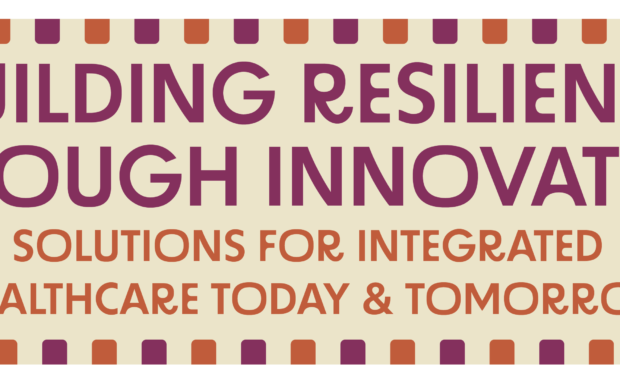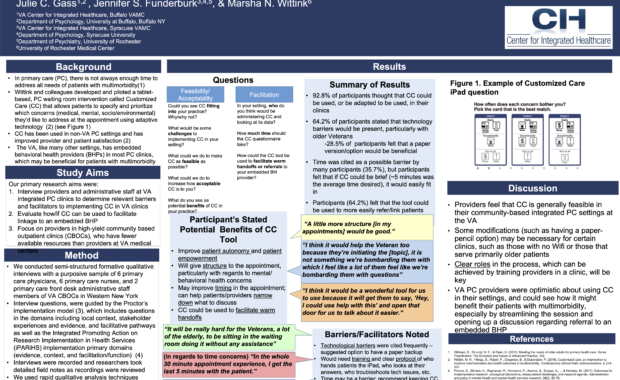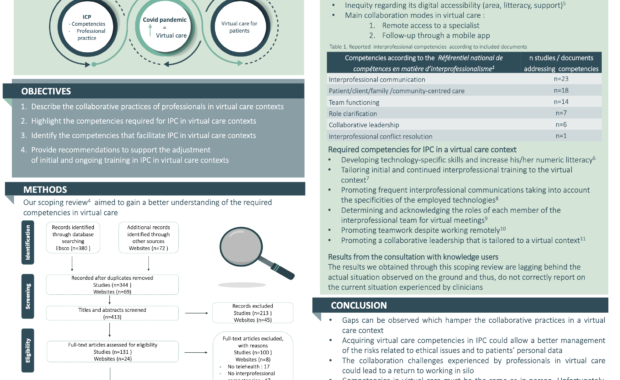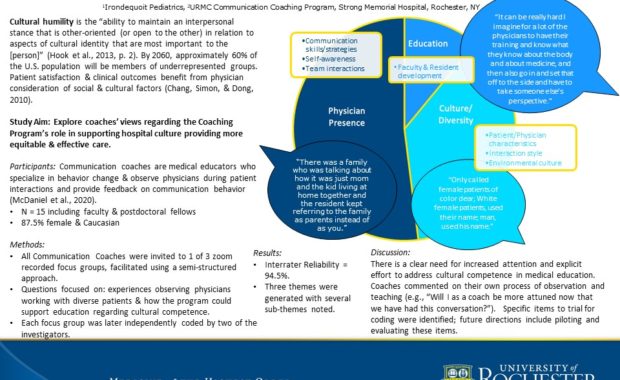The overall goal of this quality improvement (QI) project was to improve integration of behavioral health services into a family medicine residency
Poster 44 – Weight Management in Primary Care: Development of a Data Driven Clinical Pathway
This project is a quality improvement activity that seeks to Review Electronic Medical Records (EMR) at a medium sized urban family medicine residency
Poster 44 – Weight Management in Primary Care: Development of a Data Driven Clinical Pathway
This project is a quality improvement activity that seeks to Review Electronic Medical Records (EMR) at a medium sized urban family medicine residency
Poster 21 – Implementation of Integrated Behavioral Health in a Family Medicine Residency Clinic
The overall goal of this quality improvement (QI) project was to improve integration of behavioral health services into a family medicine residency
K08 – Training Primary Care Providers and Behavioral Health Providers in Using the CHATS Framework to Facilitate Warm Handoffs in Integrated Pediatric Primary Care
Warm handoffs (WHOs) are an interaction between a behavioral health provider (BHP) and primary care provider (PCP) in which information about the
K01 – Tackling the issue of ADHD referrals in Primary Care (in Adults)
With the popularity of short video clips showing the "real" ADHD, it has easily become one of the top social media crazes. The downstream effect is
I02 – The Impact of Community Based Patient Education Designed to Decrease 30-day Readmissions
Background/rationale: Across the U.S., 20% of cardiothoracic surgery patients discharged to home experience unplanned readmission within 30 days of
I01 – Strengthening Interdisciplinary Collaboration in Family-Centered Primary Care: The Role of the Behavioral Health Consultant
Background: Family-centered primary care requires interdisciplinary teamwork to effectively respond to patients and families complex needs.
F07 – Provider Satisfaction with Integrated Behavioral Health in a Rural Primary Care Practice
Background/rationale: The use of integrative models of care represent best practice for the treatment of anxiety and depression among primary care
E01 – A Match Made in Heaven: Examining the Marriage between Medicine and Behavioral Health in Integrated Settings
Covid-19 and the accompanying isolation and social unrest has strained even the strongest of relationships, both those in the personal and intimate
D06 – Taking a ‘pregnant pause’ to Evaluate an OB Pathway in PCBH
"It is extremely vital to care for women's mental health during pregnancy and after childbirth during these unprecedented times (Usmani et al., 2021,
A07 – Communication is Key: Using Registry Conferences to Improve our Co-management Culture
Communication within an integrated-care team is a critical component to a successful patient-centered, access-orientated culture. With our nation
A01 – Depressive Symptoms as a Mediator in the Association between Adverse Childhood Experiences and Perceived Medication Intolerance and Poly-Allergy
The association between adverse childhood experiences (ACEs) and mental health conditions (i.e. depression, anxiety, PTSD) and physical health
Webcast 03 – Do Traditional Psychological Batteries have Utility in the PCBH model? A Pilot Adult ADHD Clinical Pathway
If you surveyed BHCs, how many would agree that traditional psychological batteries of any kind have a place in the PCBH model? We, the presenters,
Webcast 06 – Meeting the Changing Needs to Integrated Care in the Time of the COVID-19 Pandemic with a Focus on Improving Health Equity
The COVID-19 pandemic has significantly altered daily life for most individuals. Its impact on mental health has been substantial, with increased
Poster 43 – Primary Care to Order: Adapting the Customized Care Intervention to VA Integrated Primary Care Settings
For complex patients with multiple competing concerns, the 15-minute primary care appointment can be a challenge - what to prioritize, what to ask,
Poster 40 – Interprofessional Collaboration Competencies of Health and Social Service Professionals in Virtual Care Contexts : A Scoping Review
Background : Collaborative care (CC) is an essential and effective approach to implement patient-centered care. It increases professional’s job
Poster 20 – Implementation of the Integrated Behavioral Health Plus (IBH+) Services Model: Mixed Methods Evaluation of Baseline Contextual Factors
Background/Rationale: University of Colorado implemented Integrated Behavioral Health Plus (IBH+) services (team-based care with primary care




